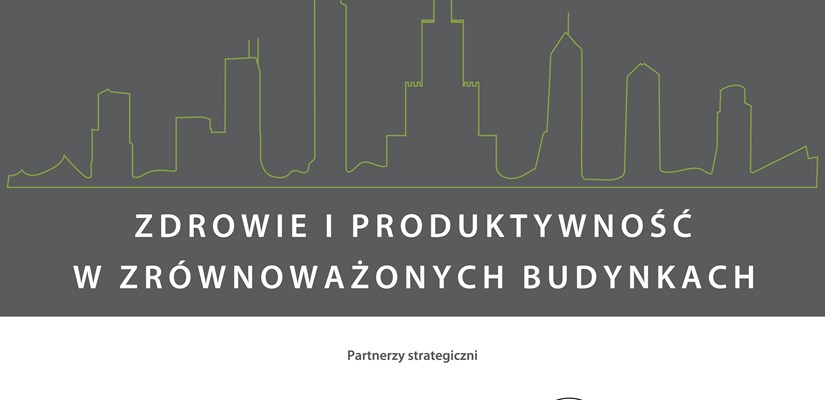
The project leader is BuroHappold Engineering, an international engineering practice, within Construction Marketing Group, an initiative of construction and commercial real estate companies, created a technical working group consisting of representatives from Colliers International, Philips Lighting, Halton Oy, Ecophon Saint-Gobain and Skanska Property Poland. The group comprises specialists from such areas as HR, marketing, engineering, architecture, acoustics as well as LEED and BREEAM certification.
“This is a groundbreaking moment for the whole market. It is the first time in Poland that such a large group of experts from numerous organizations has been engaged in verifying a global methodology regarding the influence buildings have on their users. Members of the technical committee analysed and defined the issue, underlining the fact that there is a global solution that can be successfully applied to the Polish market” says Katarzyna Chwalbińska-Kusek, Marketing and Business Development Manager at BuroHappold Engineering, founder of Construction Marketing Group.
“On average, we spend 90% of our time indoors, so interior environments have a great influence on both our health and wellbeing. Modern, sustainable offices are equipped with numerous solutions reducing negative effects, for example, by applying better ventilation systems, ensuring better access to natural daylight and creating relaxation zones. Our aim is to encourage the market to conduct integrated measurements that will help reflect the real influence of sustainable buildings on employees’ health and productivity”, adds Chwalbińska-Kusek.
As part of the project, four workshop meetings were held. The technical committee based its discussions upon the “Health, Wellbeing and Productivity in Offices” report published in 2014 by the World Green Business Council – the largest global organization engaged in green, sustainable building. The report was the first document in the world to propose a methodology for measuring the influence of office space on employees. The aim of the initiative conducted in Poland is to adjust the conclusions of the WGBC to the Polish market. The conclusions from the workshops were included in the project's white paper, entitled “Health and Productivity in Sustainable Buildings.”
The white paper is specifically aimed at investors, business leaders, tenants and real estate agents. It includes the most crucial information concerning the influence of sustainable buildings on health and efficiency of employees and introduces the benefits resulting from green solutions for companies, such as a decrease in absenteeism and staff turnover which, in turn, leads to an increase in efficiency. In the long-term, these factors can have a significant impact on a company's financial results.
“Our research shows that 54% of companies are not yet prepared to invest in sustainable office space. As a result, the main aim of our activities is to increase business awareness concerning the influence of sustainable buildings on people as well as the possible benefits available for companies that engage in introducing sustainable solutions. During the workshops, several specific tools were identified that could help conduct measurements, for example by using data on employee absenteeism and staff turnover as well as the quality of air and access to natural daylight,” asserts Katarzyna Chwalbińska-Kusek.
The White Paper ends with a list of significant engineering considerations that tenants and investors should focus on while designing office space. Among them are factors such as thermal comfort, noise, acoustics and the building’s internal configuration.
The idea of sustainable buildings is based on designing, developing and using buildings with a focus on employees’ health and with respect to the natural environment. New technologies are of the utmost importance in this process. They not only help create buildings that significantly reduce pollution and waste emission but also make the buildings comfortable for employees. Research shows that factors such as: proper air temperature (22-24°C), ventilation levels adjusted to needs, the proper lighting of work stations as well as the appropriate amount of fresh air per person (IAQ – Indoor Air Quality) are of crucial importance in providing optimal and favourable conditions. Sustainable buildings, also known as green buildings, meet all of these requirements.
Katarzyna Zawodna, Managing Director at Skanska Property Poland: “When discussing profits related to introducing sustainable solutions, most of us would firstly think about environmental protection and reducing the costs of energy consumption. Nevertheless, the biggest advantage of green buildings is the influence on employees themselves and their comfort as well as work efficiency. In USA, sick leaves cost companies even up to 2,500 USD per employee each year. Green solutions help significantly reduce the number of sick leaves and drop the costs even by 40%. In Poland however, we still lack sufficient data. Specific case studies would definitely help us better understand the profits related to applying sustainable solutions. In Skanska, we develop office schemes using ex. geothermal cooling and heating systems as well as daylight control systems enabling automatic light adjustment. The research methodology proposed in the White Paper will help us illustrate the beneficial influence of our buildings on health and staff efficiency by using specific numbers.”
Jonathan Cohen, Director, Building Consultancy I Eastern Europe, Colliers International: “Colliers increasingly finds its Clients focused on the need to attract and retain generation Y talent, which places great emphasis on the sustainability, the work environment and in particular the freedom to work away from the traditional desk in collaboration with others.”
Ian Booth, Partner, BuroHappold Engineering: “At BuroHappold Engineering we are aware that a well designed building combines a minimal negative impact on the environment with positive impact on people’s health and well-being. We regard such buildings as sustainable buildings”.
The White Paper is available at:
http://issuu.com/constructionmarketinggroup/docs/health_and_productivity